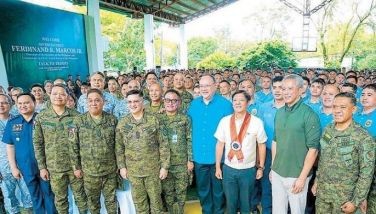Arroyo welcomes Sin’s successor
September 17, 2003 | 12:00am
President Arroyo welcomed yesterday the nomination of Lipa Archbishop Gaudencio Rosales as successor to Manila Archbishop Jaime Cardinal Sin, whose resignation from ecclesiastical duties has been accepted by Pope John Paul II.
"I join our people in welcoming His (Excellency) Gaudencio Rosales as the new Archbishop of Manila, whom I am confident will carry the torch of the faith, as a catalyst for positive change and as an instrument of good governance, just as ably and valiantly as his predecessor," the President said in a statement.
At the same time, Mrs. Arroyo lauded Cardinal Sin for his 29-year leadership of the largest archdiocese in the country.
"Cardinal Sin is a champion of Philippine democracy," the President said. "He brought the Church squarely behind the fight for human freedom and strengthened its role in the transformation of government, nation and people."
"He may have retired but his leadership and guidance will live on," she said. "He will be missed very much but we will always turn to him for his wise and endearing counsel on doing what is right and just."
Replacing the first Filipino cardinal, the late Rufino Santos, Sin was named archbishop of Manila in 1974 after successfully shepherding the Diocese of Jaro and averting what could have been an embarrassing financial scandal.
As Manila archbishop during the early years of martial law, Sin managed to "waltz" with the Marcos dictatorship until social conditions deteriorated in the 1980s as shown by the agrarian unrest in Negros Occidental and other provinces and the escalating separatist war in Mindanao.
In the mid-1980s, Sin and other Catholic prelates were already openly criticizing the Marcos regime, a situation that came to a head in February 1986 when Sin and the Church backed soldiers who were found to have been plotting a coup d’état.
The aborted coup turned into a non-violent popular uprising, backed by priests and nuns, that toppled the Marcos dictatorship and restored democratic institutions in the country.
Sin led in 2001 a similar popular uprising against the administration of jailed former President Joseph Estrada which was tainted with charges of corruption.
However, Sin developed a kidney ailment that requires regular dialysis and, shortly before his 75th birthday on Aug. 31, the Manila archbishop expressed his desire to retire from ecclesiastical duties.
Apostolic Nuncio Archbishop Antonio Franco announced the Vatican’s acceptance of Sin’s "resignation" last Monday.
While political leaders took turns lauding Sin’s spiritual leadership over 29 of the most tumultuous years of Philippine history, the Catholics in Manila and its environs grope for information on Rosales who is in the Vatican and is not expected to return until Oct. 7.
"If it dies, it bears fruit."
That was the motto Archbishop Rosales chose for his heraldic arms when he was ordained bishop on Aug. 12, 1974 at the age of 42.
Just turned 71 on Aug. 10, the Batangas-born archbishop, if he chooses, can look back on a 45-year priestly and 28-year episcopal career with pride over his accomplishments.
He has taught in parochial schools, celebrated Mass in poor churches, espoused just causes and defended the interest of his beloved church by looking after two dioceses and mentoring new priests.
Archbishop Rosales, who studied at the Jesuit-run San Jose Seminary, has taught in several seminaries and even served as rector of the San Carlos Seminary in Makati City.
He has also served as papal visitator to seminaries in the Philippines and later became a member of the Council of the Clergy of the Catholic Bishops’ Conference of the Philippines (CBCP).
The archbishop, who was ordained priest in Lipa City in 1958, was first called to the episcopacy as auxiliary bishop of Manila in 1974, the same year Cardinal Sin was named archbishop.
Eight years later, in 1982, he was assigned coadjutor bishop of Malaybalay in Bakidnon, a poor ecclesiastical territory in the northern Mindanao highlands.
He succeeded to the bishopric in 1984 and governed the diocese for 10 years, building a reputation as a "pastoral" rather than a "managerial" bishop.
It was at Malaybalay where then Bishop Rosales apparently formed his vision of a "living Church," a Church marked by spiritual growth and dynamism.
Concerned at the lean harvests of his flock, most of whom were poor farmers, Bishop Rosales and his priests riled from the pulpit against the evils of illegal logging. He even acquired a license as a forester and encouraged his priests to do the same.
The Malaybalay diocese’s anti-illegal logging crusade was believed to have been the motive behind the murder of one of Rosales’ young priests, Rev. Nery Satur.
On Dec. 30, 1992, Bishop Rosales was named Archbishop of Lipa, the archdiocese that also once had at its helm no less than three of the four Filipino priests who would be named cardinals.
Rufino Cardinal Santos, archbishop of Manila from 1953 to 1973, served as Lipa’s Apostolic Administrator before he was named to the Manila archdiocese.
Cebu Archbishop Ricardo Cardinal Vidal also served as Lipa archbishop from 1973 to 1981.
"We really didn’t expect his appointment because he is a very simple man," said Rev. Richard Panganiban, one of the archbishop’s diocesan priests and a professor at the St. Francis Seminary in Lipa.
Panganiban said Archbishop Rosales, who traces his ancestry to the first provincial caciques, was no politician and would likely stand on his principles "kahit sino masagasaan (whoever is run down)."
"He doesn’t have a gray area," Panganiban said. "If it’s black, it’s black. If white, then white."
Panganiban claimed Archbishop Rosales was twice elected as CBCP president but he declined the election "because of his simplicity, low profile and holiness in life."
In Lipa archdiocese, Archbishop Rosales summoned an archdiocesan pastoral assembly and set up a charity fund built from loose change from compassionate churchfolk.
"Archbishop Rosales is a very gentle person," said the archbishop’s personal secretary who did not want to be identified. "In my seven years serving him, I do not recall him ever shouting at anybody. He is very human. He jokes a lot, even with the maids and janitors. He is very friendly."
"(But) he gets done what needs to be done, may it be for the poor or the welfare of his fellow priests," the secretary said, adding that this is what should be expected of the archbishop when he assumes the archbishopric of Manila. — With reports from Marichu Villanueva, Jose Aravilla, Jose Rodel Clapano
"I join our people in welcoming His (Excellency) Gaudencio Rosales as the new Archbishop of Manila, whom I am confident will carry the torch of the faith, as a catalyst for positive change and as an instrument of good governance, just as ably and valiantly as his predecessor," the President said in a statement.
At the same time, Mrs. Arroyo lauded Cardinal Sin for his 29-year leadership of the largest archdiocese in the country.
"Cardinal Sin is a champion of Philippine democracy," the President said. "He brought the Church squarely behind the fight for human freedom and strengthened its role in the transformation of government, nation and people."
"He may have retired but his leadership and guidance will live on," she said. "He will be missed very much but we will always turn to him for his wise and endearing counsel on doing what is right and just."
Replacing the first Filipino cardinal, the late Rufino Santos, Sin was named archbishop of Manila in 1974 after successfully shepherding the Diocese of Jaro and averting what could have been an embarrassing financial scandal.
As Manila archbishop during the early years of martial law, Sin managed to "waltz" with the Marcos dictatorship until social conditions deteriorated in the 1980s as shown by the agrarian unrest in Negros Occidental and other provinces and the escalating separatist war in Mindanao.
In the mid-1980s, Sin and other Catholic prelates were already openly criticizing the Marcos regime, a situation that came to a head in February 1986 when Sin and the Church backed soldiers who were found to have been plotting a coup d’état.
The aborted coup turned into a non-violent popular uprising, backed by priests and nuns, that toppled the Marcos dictatorship and restored democratic institutions in the country.
Sin led in 2001 a similar popular uprising against the administration of jailed former President Joseph Estrada which was tainted with charges of corruption.
However, Sin developed a kidney ailment that requires regular dialysis and, shortly before his 75th birthday on Aug. 31, the Manila archbishop expressed his desire to retire from ecclesiastical duties.
Apostolic Nuncio Archbishop Antonio Franco announced the Vatican’s acceptance of Sin’s "resignation" last Monday.
While political leaders took turns lauding Sin’s spiritual leadership over 29 of the most tumultuous years of Philippine history, the Catholics in Manila and its environs grope for information on Rosales who is in the Vatican and is not expected to return until Oct. 7.
That was the motto Archbishop Rosales chose for his heraldic arms when he was ordained bishop on Aug. 12, 1974 at the age of 42.
Just turned 71 on Aug. 10, the Batangas-born archbishop, if he chooses, can look back on a 45-year priestly and 28-year episcopal career with pride over his accomplishments.
He has taught in parochial schools, celebrated Mass in poor churches, espoused just causes and defended the interest of his beloved church by looking after two dioceses and mentoring new priests.
Archbishop Rosales, who studied at the Jesuit-run San Jose Seminary, has taught in several seminaries and even served as rector of the San Carlos Seminary in Makati City.
He has also served as papal visitator to seminaries in the Philippines and later became a member of the Council of the Clergy of the Catholic Bishops’ Conference of the Philippines (CBCP).
The archbishop, who was ordained priest in Lipa City in 1958, was first called to the episcopacy as auxiliary bishop of Manila in 1974, the same year Cardinal Sin was named archbishop.
Eight years later, in 1982, he was assigned coadjutor bishop of Malaybalay in Bakidnon, a poor ecclesiastical territory in the northern Mindanao highlands.
He succeeded to the bishopric in 1984 and governed the diocese for 10 years, building a reputation as a "pastoral" rather than a "managerial" bishop.
It was at Malaybalay where then Bishop Rosales apparently formed his vision of a "living Church," a Church marked by spiritual growth and dynamism.
Concerned at the lean harvests of his flock, most of whom were poor farmers, Bishop Rosales and his priests riled from the pulpit against the evils of illegal logging. He even acquired a license as a forester and encouraged his priests to do the same.
The Malaybalay diocese’s anti-illegal logging crusade was believed to have been the motive behind the murder of one of Rosales’ young priests, Rev. Nery Satur.
Rufino Cardinal Santos, archbishop of Manila from 1953 to 1973, served as Lipa’s Apostolic Administrator before he was named to the Manila archdiocese.
Cebu Archbishop Ricardo Cardinal Vidal also served as Lipa archbishop from 1973 to 1981.
"We really didn’t expect his appointment because he is a very simple man," said Rev. Richard Panganiban, one of the archbishop’s diocesan priests and a professor at the St. Francis Seminary in Lipa.
Panganiban said Archbishop Rosales, who traces his ancestry to the first provincial caciques, was no politician and would likely stand on his principles "kahit sino masagasaan (whoever is run down)."
"He doesn’t have a gray area," Panganiban said. "If it’s black, it’s black. If white, then white."
Panganiban claimed Archbishop Rosales was twice elected as CBCP president but he declined the election "because of his simplicity, low profile and holiness in life."
In Lipa archdiocese, Archbishop Rosales summoned an archdiocesan pastoral assembly and set up a charity fund built from loose change from compassionate churchfolk.
"Archbishop Rosales is a very gentle person," said the archbishop’s personal secretary who did not want to be identified. "In my seven years serving him, I do not recall him ever shouting at anybody. He is very human. He jokes a lot, even with the maids and janitors. He is very friendly."
"(But) he gets done what needs to be done, may it be for the poor or the welfare of his fellow priests," the secretary said, adding that this is what should be expected of the archbishop when he assumes the archbishopric of Manila. — With reports from Marichu Villanueva, Jose Aravilla, Jose Rodel Clapano
BrandSpace Articles
<
>
- Latest
- Trending
Trending
Latest
Trending
Latest
Recommended































